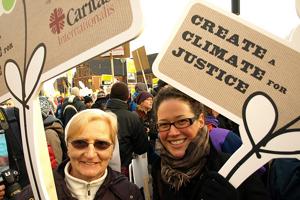
Sr. Aine Hughes of Caritas South Africa during the climate justice walk in Copenhagen
Credits: Caritas
Participants from the Church in Africa and Caritas Africa members have met in Johannesburg, South Africa to plan their response to the challenges of climate change.
The Consultative Meeting of Secam-Caritas Africa Working Group on Natural Resources and Climate Change (SECAM stands for the Symposium of Episcopal Conferences of Africa and Madagascar) brought together 25 participants from 7 to 11 May.
“This conference took place at very opportune time in South Africa when a debate was raging about the issue of [the oil company] Shell’s proposed exploration for gas in the Karoo by means of ‘fracking’” said Sr. Aine Hughes, Caritas South Africa.
“The Karoo is one of the most sensitive and unique bio-diverse areas and the impacts of the ‘fracking’ include pollution of aquifer water, air pollution and of course, climate change impacts from the burning of gas and the release of methane—a potent greenhouse gas,” she said.
“The church encourages the government of South Africa to protect its national heritage and the lives of its people from the possible health hazards and increased poverty risk that such a process would generate.”
Participants were asked to reflect on the social teaching of the Catholic Church and the outcomes of the Second African Synod regarding the common good and the management of the natural resources in Africa and to develop a common understanding on policies needed to implement those changes.
The local Church shared lessons learned and good practices and some advocacy initiatives regarding the extractive industries were explored. Land grabbing and adaptation to climate change was a major focus.
Links were made with some local and regional civil society organisations and ecumenical networks in view of strengthening the African Global Climate Justice Alliance. This is key to supporting the leadership of the Church in Africa at the UN Climate Summit in Durban at the end of the year.
Sr. Hughes said that this conference was a valuable starting point for UNFCCC COP 17 in Durban for a campaign by the church to put more pressure on government to focus on renewable energy.
“Nature has given us lessons and warnings like Fukushima. How we respond here and now will decide what kind of world we are going to live in and what kind of world we will pass on to our children,” she said.
The outcome of this meeting was to develop a policy paper by the Church in Africa regarding the management of natural resources taking into consideration the impacts of the new challenges such as the climate change and the extractive industries.
This document and the relevant activities to follow will be the contribution of the Church towards a better deal at the next United Nations Framework Convention on Climate Change (COP 17) which will be held in Durban in November.
For more information contact: Firmin Adjahossou, Chargé de Campagnes et Plaidoyer Programme Bonne Gouvernance, Justice, Paix et Développement; SECAM-SCEAM
